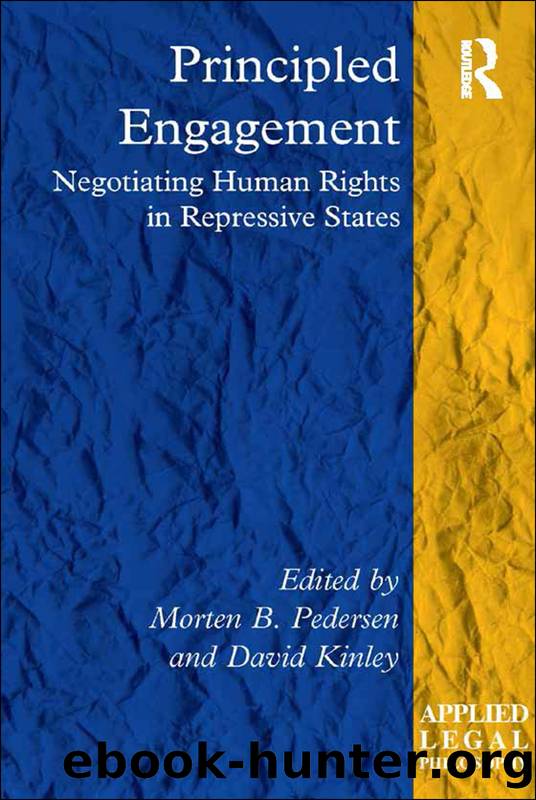Principled Engagement: Negotiating Human Rights in Repressive States by Morten B. Pedersen & David Kinley

Author:Morten B. Pedersen & David Kinley [Pedersen, Morten B. & Kinley, David]
Language: eng
Format: epub
Tags: Political Freedom, Political Science
ISBN: 9781317075905
Google: nArtCwAAQBAJ
Publisher: Routledge
Published: 2016-04-08T12:52:37+00:00
Endnotes
1 Article 33 of the Constitution of the International Labour Organization.
2 For example, the Government stated in 1993 that over a period of two years almost 800,000 local people had âvolunteeredâ their labour for the construction of the railway from Aungban to Loikaw. âForced Labour in Myanmar (Burma). Report of the Commission of Inquiry appointed under article 26 of the Constitution of the International Labour Organization to examine the observance by Myanmar of the Forced Labour Convention, 1930 (No. 29)â, ILO, Official Bulletin, Vol. LXXXI, 1998, Series B, Special supplement, 156.
3 Ibid., paragraph 1.
4 Ibid., paragraph 536.
5 Ibid., paragraph 543.
6 For an illuminating discussion of the effectiveness of the ILOâs enforcement mechanisms in light of the Myanmar experience (up to 2003), see Francis Maupain, âIs the ILO Effective in Upholding Workersâ Rights?â, in Philip Alston (ed.), Labour Rights as Human Rights (Oxford: Oxford University Press, 2005).
7 Myanmar Ministry of Foreign Affairs. Press Release, Yangon, 17 June 1999.
8 That is, the first ILO mission since the Commission of Inquiry. Up until 1996, the ILO had had some limited technical assistance activities in Myanmar and there had been occasional visits to the country in that connection.
9 âPity ILO!â (parts 1 and 2), New Light of Myanmar, 23 and 24 May 2000.
10 âOrder Directing Not To Exercise Powers Under Certain Provisions of The Towns Act, 1907 and the Village Act, 1907â, Myanmar Ministry of Home Affairs Order No. 1/99, 14 May 1999.
11 See ILO Governing Body, 279th Session, provisional verbatim of the fourth sitting, Thursday, 16 November 2000, morning.
12 Letter to the Myanmar Minister for Labour dated 1 March 2001, reproduced in appendix 5 of ILO document GB.280/6, Geneva, March 2001.
13 The Myanmar Ambassador in Geneva, who was a disarmament expert and chaired the UN General Assemblyâs First Committee on disarmament and international security in 2000, compared sanctions to the nuclear deterrent: âThe best sanctions are those that are never used and never carried out. Sanctions are like nuclear weapons. Their value lies in their deterrent effect, not in their actual use.â See International Labour Conference, 89th Session, Geneva, 2001, Provisional Record 19, part 3, p. 2.
14 See ILO documents GB.280/6, GB.280/6(Add.1), and GB.280/6(Add.2), Geneva, March 2001.
15 Frances Williams and Edward Alden, âForced Labour in Burma Tests ILOâs Will to Uphold Global Standardsâ, Financial Times, 27 March 2001.
16 Elizabeth Olson, âMyanmar Tests Resolve of ILO on Enforcing Standardsâ, New York Times, 4 June 2001 (actually written in March 2001, but published later with little updating).
17 âThe Question of Steps to Respond to Sanctions which Might Be Imposed by the ILOâ, restricted memorandum, Myanmar Ministry of Foreign Affairs, 2 December 2000, paragraphs 6 and 7. (While the authenticity of this document cannot be confirmed, it appears likely to be genuine.)
18 See âUnion Activists Hold up Burmese Ship at Calcutta Portâ, Mizzima News Group, 21 August 2000; and Krittivas Mukherjee, âMyanmarese Vessel Freed after Federal Interventionâ, India Abroad News Service, 22 August 2000.
19 See ILO document GB.282/4, Geneva, November 2001, paragraph 86.
20 See, for example,
Download
This site does not store any files on its server. We only index and link to content provided by other sites. Please contact the content providers to delete copyright contents if any and email us, we'll remove relevant links or contents immediately.
Killers of the Flower Moon by David Grann(3241)
Machine Learning at Scale with H2O by Gregory Keys | David Whiting(2293)
Will by Will Smith(2043)
Guns, Germs and Steel by Diamond Jared(1885)
Borders by unknow(1786)
The Room Where It Happened by John Bolton;(1721)
The Color of Law by Richard Rothstein(1576)
Once Upon a Broken Heart by Stephanie Garber(1486)
Water Rights and the Environment in the United States by John Burch(1414)
Friends, Lovers, and the Big Terrible Thing by Matthew Perry(1330)
Examples & Explanations: Administrative Law by William F. Funk & Richard H. Seamon(1326)
A Short History of War by Jeremy Black(1300)
HBR's 10 Must Reads 2022 by Harvard Business Review(1256)
Pharmacy Practice and The Law by Richard Abood(1254)
The Strength In Our Scars by Bianca Sparacino(1252)
That Every Man Be Armed by Stephen P. Halbrook(1237)
The Guarded Gate by Daniel Okrent(1220)
515945210 by Unknown(1209)
Injustices by Ian Millhiser(1199)
